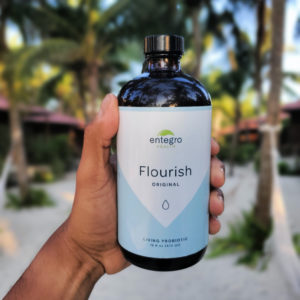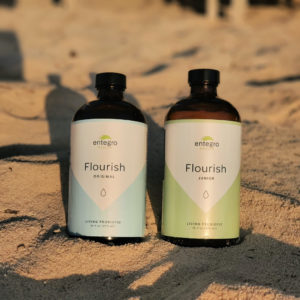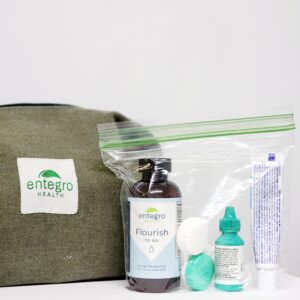Gut-Healthy Traveling
What is gut-healthy traveling , you may wonder? Traveling to new places can impact your gut health for the worse, but probiotics can help prevent or reduce this unwanted distress!
To travel is to truly experience this beautiful and dynamic world, many say. Whether you are jet-setting across the globe or road-tripping across the state, the excitement that comes with traveling is hard to beat. Visiting new areas means soaking in new sights, unique cultures, delicious food, and so much more. However, new destinations can also mean encountering foreign microorganisms that can impact our digestive system for the worse.
Travel Stressors
Traveling usually means great fun and adventure, but there can also be a fair amount of stress that comes into play. Traveling requires proper planning, packing, and even physical labor like loading up your car or camper for the entire family. Furthermore, the act of traveling itself can also be taxing. From navigating the intricacies of the airport to being crammed in a car driving for several hours, traveling most definitely takes effort! 
Additionally, your digestive system and immune system also require effort when traveling! With every new destination comes the possibility of interacting with new microbes in food, water, and even the air. The immune system reacts to foreign invaders and becomes triggered when you breathe in different pollen and other unique particles in the air. Even more, these systems can activate if you ingest any pathogenic bacteria from contaminated food or water.
Travel-Gut Conditions
The most common GI symptoms that arise when traveling include bloating, constipation, and diarrhea. A commonly known condition that impacts gut-healthy traveling is traveler’s diarrhea (TD), which causes loose stools and abdominal cramping. The most common way to contract TD is from eating contaminated food or drinking contaminated water.
Traveler’s Diarrhea
Technically, TD can be contracted anywhere humans live, but there are areas with higher risk such as Mexico, Central America, South America, and Southeast Asia. Interestingly, the source of traveler’s diarrhea is not isolated to a single pathogen, but infectious agents are usually to blame. These include bacteria, viruses, and parasites. Luckily, TD is not life-threatening and often goes away on its own after a few days of feeling unpleasant. 
Pathogens do not always cause gut distress when traveling, however. Remembering all the stressors that can accompany traveling, we know that mental stress alone can wreak havoc on your gut and immune system. Add in sleep deprivation, dehydration, and processed foods, and you’ve got a recipe for constipation and other gut ailments. It’s easy to let healthy habits go when traveling, but remembering simple things like drinking enough water and moving your body can make a huge difference!
Traveler’s Insurance with Probiotics
Aside from managing your stress and avoiding contaminated food and water, there is an important tool to have in your travel toolbox for healthy-gut traveling.
Research shows that quality probiotics can help battle the unpleasant gut disorders people get when traveling.
Gut health is important because our gut is the primary connection to the outside world. Amazingly, every human body is designed to have a balanced gut bacteria population, also known as the gut microbiome. The good bacteria in our gut help us resist disease!
When traveling, all the various stressors and potential pathogens can throw the proper balance off, hindering the growth of good, health-promoting bacteria. Fortunately, taking a quality probiotic like Flourish can help restore and replenish the natural balance of good microbes in our gut, which aids in gut-healthy traveling!
What Does the Research Say?
How do the good bugs make the gut more resilient to stressors of travel you might be wondering? Studies show that beneficial bacteria can help uphold the strength of our gut lining by out-competing the invaders for space along the intestinal epithelial cells. According to research, multiple strains of Lactobacillus and Bifidobacterium can fight off the bad bugs. Both of these strains are in Flourish probiotics. 
Over the years, many studies looked at the potential for probiotics to aid in the prevention of traveler’s diarrhea. More recently, meta-analyses were performed, gathering only the “gold standard” of studies (double-blind, placebo-controlled, randomized human trials) throughout recent and previous decades.
These analyses concluded that there is, in fact, a statistical significance for the efficacy in the prevention of traveler’s diarrhea using probiotics.
Research also shows probiotics help prevent and aid in a faster recovery from other forms of food poisoning. Ultimately, it is safe to say that the good guys in our gut play an important role in discouraging these pathogenic digestive conditions!
When to Take Probiotics for Traveling
The best time to start taking probiotics for gut-healthy traveling is at least two weeks before you plan to travel. However, we recommend taking probiotics consistently as a part of a gut-healthy daily routine since most people encounter gut stressors daily. Taking probiotics consistently before traveling can help improve your immune function and gut resilience before your body needs it. Furthermore, it is also beneficial to continue taking your probiotics while traveling, as well as after you return.
Gut-Healthy Traveling with Probiotics
There are key attributes to look for in a probiotic for travel. Importantly, you should choose a product that’s shelf-stable. Those that require refrigeration may not be as travel-friendly. Although we recommend refrigerating Flourish probiotics, it is not required! Even more, our product is shelf-stable for up to 30 days, and refrigeration is recommended simply to slow down the aging process. Leaving Flourish out of the fridge will not make it any less potent or harmful to ingest. 
Secondly, Flourish is safe to travel with on airplanes, but we suggest securing your bottle in a grip-seal bag in case any product leaks out due to the pressurization caused by the living microbes’ natural and beneficial by-products. However, this doesn’t always happen and leakage is minimal if it does occur. Entegro Health has recently launched TSA-allowed Flourish TO GO 4-pack bundles for a limited time! These 3.4 fl. oz. bottles contain 6.6 adult size daily doses each and makes packing your probiotics so easy! Next, it is important to check your “best before” date on your probiotic so that the bacteria are still viable during your travel. Also, you should look for a probiotic that has a worthwhile amount of CFUs (colony-forming units) and a healthy diversity of species. Each batch of Flourish probiotics is third-party tested to ensure a minimum of 8 billion CFUs per dose, including 11 different probiotic strains from 5 different genera.

Travel with No Regret!
Traveling should be an experience filled with enjoyment and not having to worry about digestive discomfort. Gut-healthy traveling is the best way to travel! Look out for your gut health the next time you travel with the added insurance of a quality probiotic like Flourish. 
The content in this post is not a substitute for professional medical advice, diagnosis, or treatment. Always seek the advice of your physician or other qualified health providers with any questions you may have regarding a medical condition.
Written by Kelsy Armstrong, Entegro Health
Works Cited:
- Bae Jong-Myon. “Prophylactic Efficacy of Probiotics on Travelers’ Diarrhea: An Adaptive Meta-Analysis of Randomized Controlled Trials.” Epidemiology and Health. 2018;49:e2018043. doi:10.4178/epih.e2018043. https://www.ncbi.nlm.nih.gov/pmc/articles/PMC6232657/.
- Kim M. S., Yoon Y. S., Seo, J. G., Lee H. G., Chung M. J., Yum D. Y. “A Study on the Prevention of Salmonella Infection by Using the Aggregation Characteristics of Lactic Acid Bacteria.” Toxicological Research. 2013;
- 29(2), 129–135. https://www.ncbi.nlm.nih.gov/pmc/articles/PMC3834453/.
- Mayo Clinic Staff. “Traveler’s Diarrhea.” Mayo Clinic Diseases & Conditions. Aug. 2021,
- https://www.mayoclinic.org/diseases-conditions/travelers-diarrhea/symptoms-causes/syc-20352182.
- McFarland L.V. “Meta-analysis of Probiotics for the Prevention of Traveler’s Diarrhea.” Travel Med Infect Dis. 2007 Mar;5(2):97-105. doi: 10.1016/j.tmaid.2005.10.003. Epub 2005 Dec 5. PMID: 17298915. https://pubmed.ncbi.nlm.nih.gov/17298915/.
- Mujagic Z., de Vos P, Boekschoten M.V., Govers C., Pieters H.H., de Wit N.J., Bron P.A., Masclee A.A., Troost F.J. “The Effects of Lactobacillus Plantarum on Small Intestinal Barrier Function and Mucosal Gene Transcription; A Randomized Double-blind Placebo Controlled Trial.” Sci Rep. 2017;7:40128. doi: 10.1038/srep40128. PMID: 28045137; PMCID: PMC5206730.
- Ratan-N.M. M. “Should You Take Probiotics Whilst Traveling?” News Medical Life Sciences. March 2019, https://www.news-medical.net/health/Should-You-Take-Probiotics-Whilst-Travelling.aspx.
- Sanders M.E. “Impact of Probiotics on Colonizing Microbiota of the Gut.” J. Clin. Gastroenterol. 2011;45 Suppl:S115-9. doi: 10.1097/MCG.0b013e318227414a. PMID: 21992949.
- Wang F., Feng J., Chen P., Liu X., Ma M., Zhou R., Chang Y., Liu J., Li J., Zhao Q. “Probiotics in Helicobacter pylori Eradication Therapy: Systematic Review and Network Meta-analysis.” Clin. Res. Hepatol Gastroenterol. 2017;41(4):466-475. doi: 10.1016/j.clinre.2017.04.004. Epub 2017 May 25. PMID: 28552432.
- Wilkins T., Sequoia J. “Probiotics for Gastrointestinal Conditions: A Summary of the Evidence.” Am. Fam. Physician. 2017 Aug.;96(3):170-178. PMID: 28762696. https://pubmed.ncbi.nlm.nih.gov/28762696/.

 New customers! Get 11% OFF your first Flourish order with Code FRESHSTART11
New customers! Get 11% OFF your first Flourish order with Code FRESHSTART11